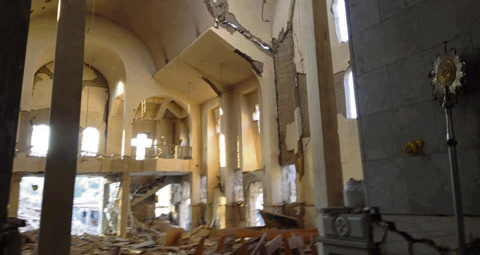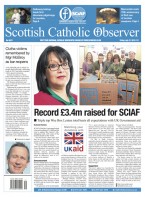October 11 | ![]() 0 COMMENTS
0 COMMENTS ![]() print
print

No victory in violence
JOHN NEWTON, press officer for AID TO THE CHURCH IN NEED, explains how Syria’s Patriarch Gregorios III—the leader of the country’s Catholics —is preaching peace against the backdrop of war and outlines the organisation’s work in helping those whose lives have been affected by the conflict
SPEAKING in Glasgow next week, the leader of Syria’s Catholics will warn that only peace and dialogue can end the suffering of Syria’s people. Despite plans by the US to shell Syria having been shelved, fierce fighting in the country continues, with the rebels having received additional weapons from the US and reports suggesting Russia has also provided increased military aid for President Bashar al-Assad’s troops. But against the backdrop of war, Patriarch Gregorios III has been a voice pleading for peace, highlighting the pain being endured by ordinary Syrians caught in the conflict.
The patriarch has repeatedly stressed that there will be ‘no victory through weapons and violence. Violence leads to violence and weapons to other weapons. The parties to the conflict will continue to fight to the bitter end, as they all have an abundance of weapons.’ Words that now seem prophetic, given the new weapons flowing into the country from Russia and the US.
Patriarch Gregorios III, who is head of the Melkite Greek-Catholic Church—an Eastern Church in full communion with the Pope—has pointed out that overseas backing for both sides in the conflict has led to vast numbers of deaths and additional suffering for the people of Syria.
“For the last two and a half years, Eastern and Western countries have not stopped sending weapons, money, military experts, secret service agents and Salafist [a hard-line Sunni Muslim movement] fundamentalist armed gangs of thugs and criminals, who have fallen on Syria like a destructive new flood, far more dangerous even than destructive chemical weapons—whose use on our Syrian soil we reject on any pretext whatever, the pariarch said. “Those above mentioned factors have caused the death of 100,000 victims, the forced displacement of eight million Syrians, the traumatisation of two million children, the destruction of the academic future of millions of school-children and students and the destruction of thousands of villages, not to mention the wrecking of both infrastructure and institutions, widespread chaos, the abduction of thousands of people (men, women and children), rape, extortion of ransom, robberies, assaults on civilians, hatred, enmity, revenge, exacerbation of ethnic and religious conflicts, and that among members of the same country, or sometimes of the same family.”
Salafist fundamentalists have often targeted Christians, Alawite Muslims, and other religious minorities, bringing suffering to these communities. Well-loved clerics have been abducted, like Orthodox Archbishop Boulos Yazigi and Syrian Orthodox Archbishop Yohanna Ibrahim who were seized near the city of Aleppo in April, or Fr Paolo dall’Oglio, an Italian priest who had been working in Syria for 30 years who was kidnapped in July. Their fates are still unknown. But where the fate of abducted priests is known it is shocking. Orthodox priest Fr Fadi Jamil Haddad, was seized while trying to negotiate the release of a parishioner, a doctor, who had been kidnapped a few days earlier. Six days after his abduction, his body was found on the roadside. There were signs of torture and mutilation on his body, and his eyes had been gouged out.
It is not just clergy who are targeted. The largely Christian settlement of Rableh was blockaded by opposition soldiers, isolating 12,000 Catholics in the village. It was not the first Christian village to be cut off by rebel troops in this way. According to reports the Faithful there were living on bread and water, and there was a chronic shortage of medicine, needed to treat the sick and wounded. Patriarch Gregorios III called on all those of good will in the country to do what they could for the inhabitants of Rableh and all other villages which have been similarly affected. Unfortunately things took a turn for the worst and at the end of last month 280 villagers in Rableh were seized by armed gangs, and are still (at time of writing) being held as hostages in a school in nearby Gousseh village.
Destruction
Churches in the area have also been attacked. Writing to the Patriarch Gregorios, Archbishop Youhanna Abdo Arbash of Homs, Hama and Yabrud described the condition of Rableh’s Monastery of the Prophet Elijah.
“This large building was the target of the worst ravages: destruction of icons, statues of the Virgin Mary and Prophet Elijah,” he wrote. “The whole site has been laid waste, the monastery’s headquarters and perimeter wall… All the contents of the priest’s office have been stolen including furniture and documents.”
Archbishop Youhanna also described the terrible situation facing all those who have remained in Homs. He said: “The high cost of living, due to elevated prices of raw materials and food products, is exhausting our Faithful. Despite the fact that prices are rising, wages have not increased, posing a significant inflation problem. Many people have lost their jobs after factories were destroyed and stores closed. Today, most families depend for their living on charities.” Aid to the Church in Need is providing emergency aid to about 6000 families in Homs, part of its total aid for the country which has topped more than £350,000.
Patriarch Gregorios who is president of the Assembly of Catholic Hierarchs in Syria—which represents the country’s various Catholics Churches, including the Melkite Church, the Syriac Catholic Church, the Maronite Church, and the Roman Catholic Church—knows that only peace will relieve the plight of all Syria’s people, Christian and non-Christian alike.
He said: “The tragic situation that Syria has been experiencing for the last two and a half years is the strongest evidence of the primary importance of seeking the earliest possible peaceful, diplomatic resolution of the crisis.
“We have been and will remain one Syrian family, working as one, for a renewed Syria, one country for all its children.”
Patriarch Gregorios III will be speaking on Monday October 21, after Mass at 7pm at Christ the King Church, 220 Carmunnock Road, King’s Park, Glasgow G44 5AP. The patriarch has been invited to Scotland by Aid to the Church in Need to launch the charity’s new Persecuted and Forgotten? report, which assesses the situation in 30 countries where Christians have suffered persecution or discrimination. One of its key findings is a continuing exodus of Christians from countries in the Middle East. To read the report visit www.acnuk.org/persecution
Martyrdom in Maalula
When Maalula, in the west of Syria, was stormed by opposition forces its Christian inhabitants were targeted by Islamists among the soldiers. Unlike numerous other attacks on Christians the incident made the international media, largely because western Aramaic—the language Jesus probably spoke—was still used there. When Archbishop Samuel Aquila of Denver, Colorado in the US addressed members of the Equestrian Order of the Holy Sepulchre of Jerusalem on September 21, he reflected on the events.
“On September 7 armed rebels affiliated with the Islamist groups Al-Nusra Front and Al-Qaeda descended on the town and began entering houses, Archbishop Aquila said. “As they went through Maalula, the rebels defaced any sacred images they found in the homes.
“In one house, the militants found three Greek Catholic men and one woman: Mikhael Taalab, his cousin Antoun Taalab, Sarkis el Zakhm, who was Mikhael’s grandson, and the woman who related the tragedy… The rebels demanded that everyone present convert to Islam or face death.
“Sarkis el Zakhm, the grandson, responded: ‘I am a Christian and if you want to kill me because I am a Christian, do it.’ Sarkis, together with the two other men in the house, was killed in cold blood. Somehow, the woman was only injured and miraculously survived. She is currently being treated at a hospital in Damascus.
“I share this story because I believe it will help us to respond to the question: ‘What do we do once the Year of Faith is over?’”











